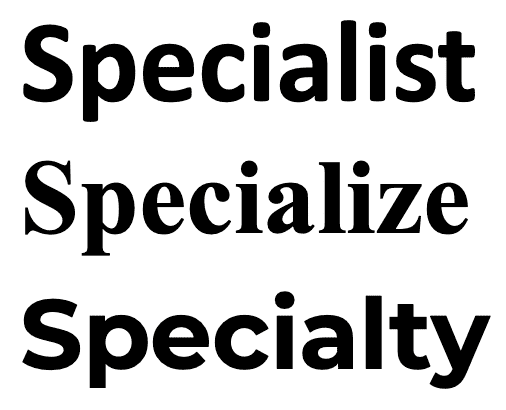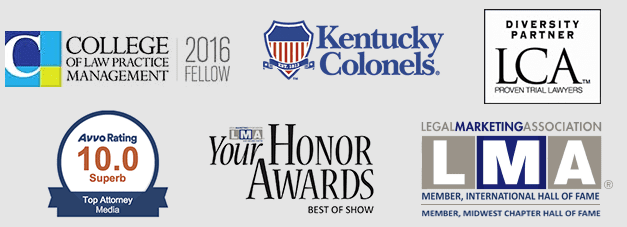Marketing can be an ethical minefield for lawyers and their marketers.
Lawyers face unique challenges when it comes to marketing their services. While they are expected to advertise and promote their practice like any other business, they are also bound by strict ethical rules that govern their conduct.
Failure to adhere to these rules can result in disciplinary action, loss of clients, and damage to the lawyer’s reputation. In this article, we will discuss the top ten professional ethics mistakes lawyers make regarding their marketing, with examples and citations to the ABA Model Rules.
- Misrepresenting Qualifications: Rule 7.1 of the ABA Model Rules prohibits lawyers from making false or misleading statements about their qualifications or experience. This includes exaggerating their skills or abilities or claiming to be certified or specialized in an area of law in which they are not, or where their state does not permit these claims.
- Example: A lawyer who has taken a single class on immigration law cannot claim to be an “expert” in the field.
- Failing to Disclose Limitations: Rule 7.4 of the ABA Model Rules requires lawyers to disclose that they are not certified in a particular area of law unless they hold a valid certification from an accredited organization. Failure to do so can be misleading to potential clients who may believe the lawyer has specialized training in a particular area when they do not.
- Comparing Services: Rule 7.2 of the ABA Model Rules prohibits lawyers from making comparisons between their services and those of another lawyer unless they can be factually substantiated.
- Example: A lawyer cannot claim to be “better” than another lawyer unless they have evidence to support that claim.
- Soliciting Clients Improperly: Rule 7.3 of the ABA Model Rules governs how lawyers can solicit potential clients. This includes prohibiting unsolicited contact, using coercion or duress, and making false or misleading statements.
- Example: A lawyer who sends an unsolicited email to a potential client without their consent may be in violation of this rule.
- Using Unapproved Language: Rule 7.5 of the ABA Model Rules prohibits lawyers from using language in their advertising that is false or misleading. This includes using terms such as “specialist,” “expert,” or “certified” without proper certification or using exaggerated language to describe their services.
- Example: A lawyer who claims to have a 100% success rate may be in violation of this rule.
- Failing to Maintain Client Confidentiality: Rule 1.6 of the ABA Model Rules requires lawyers to maintain client confidentiality. This includes not using client information in advertising or marketing materials without the client’s consent.
- Example: A lawyer who uses a client’s case as a success story without their permission may be in violation of this rule.
- Making Guarantees: Rule 7.1 of the ABA Model Rules prohibits lawyers from making guarantees about the outcome of a case. This includes statements such as “we will win your case” or “we guarantee a settlement.”
- Example: A lawyer who promises a client a specific outcome in their case may be in violation of this rule.
- Overbilling Clients: Rule 1.5 of the ABA Model Rules prohibits lawyers from charging clients excessive fees or engaging in overbilling practices. This includes charging for time not actually spent on a case or inflating billable hours.
- Example: A lawyer who bills for 10 hours of work on a case when they only worked for 5 may be in violation of this rule.
- Failing to Disclose Conflicts of Interest: Rule 1.7 of the ABA Model Rules requires lawyers to disclose any conflicts of interest to potential clients before taking on their case. Failure to do so can result in a violation of this rule.
- Example: A lawyer who represents both the plaintiff and defendant in a case without clear notice and waiver from both parties should be in violation of 1.7.
- Failing to supervise non-lawyer staff: Lawyers are ultimately responsible for the actions of their non-lawyer staff, especially when it comes to marketing and advertising. Failing to properly supervise non-lawyer staff can lead to ethical violations.
- Example: A non-lawyer firm marketer may make false or misleading statements in an advertisement or violate confidentiality rules by discussing a client’s case with others. It is the lawyer’s responsibility to ensure that their staff is properly trained and educated on the ethics rules that apply to marketing and advertising.
- Example: A law firm hires a marketing consultant to develop a new advertising campaign. The consultant creates an ad that makes claims about the firm’s success rates without any factual basis. The lawyer approves the ad without verifying its accuracy or reviewing the claims. The ad runs for several weeks before the lawyer realizes the mistake and takes it down. In this case, the lawyer failed to properly supervise the marketing consultant and allowed false and misleading information to be disseminated.
- Failing to properly identify attorney advertising: All attorney advertising must be clearly identified as such. Lawyers must include the phrase “Attorney Advertising” in all advertisements, including their website, social media profiles, and other promotional materials. This helps to ensure that potential clients understand that the communication is an advertisement and not a personal referral or recommendation.
- Example: A lawyer creates a blog post discussing a recent case they won. The post includes the lawyer’s contact information and a call to action for potential clients to contact them. However, the post does not include any indication that it is an advertisement, such as the phrase “Attorney Advertising.” This failure to properly identify the communication as advertising could lead potential clients to believe that the post is a personal endorsement rather than an advertisement.
- Offering improper fee arrangements: Lawyers must ensure that their fee arrangements are fair and reasonable. They must not engage in fee-splitting or accept referral fees unless they comply with the applicable ethics rules. They must also ensure that their fees are not excessive and are commensurate with the services provided.
- Example: A lawyer agrees to take on a personal injury case on a contingency fee basis. However, the fee agreement includes a provision that allows the lawyer to charge the client for expenses that are not necessary or reasonable, such as travel expenses or expensive equipment rentals. This fee arrangement could be considered improper and a violation of the ethics rules.
- Failing to disclose conflicts of interest: Lawyers must avoid conflicts of interest and, when they do arise, must disclose them to the affected clients. This includes conflicts of interest that may arise in the marketing and advertising of legal services. Failing to disclose conflicts of interest can lead to a violation of the ethics rules and damage the lawyer’s reputation.
- Example: A lawyer creates an advertisement for their estate planning services. The advertisement prominently features a photograph of the lawyer and their spouse. However, the lawyer fails to disclose that their spouse is also an estate planning attorney and works at a competing law firm. This failure to disclose the potential conflict of interest could lead potential clients to believe that the lawyer is the only attorney involved in their case.
- Failing to keep accurate records: Lawyers must maintain accurate records of their advertising and marketing activities. This includes keeping copies of all advertisements and promotional materials, as well as records of any payments made to advertising vendors or consultants. Failure to maintain accurate records can lead to a violation of the ethics rules and make it difficult to defend against a complaint or investigation.
- Example: A lawyer hires a marketing consultant to develop an advertising campaign. The consultant provides several drafts of the ad, but the lawyer fails to keep copies of the drafts or the final version of the ad. Later, a client files a complaint with the ethics board, alleging that the ad contained false and misleading information.
In conclusion, legal professionals need to be aware of the professional ethics rules applicable to their marketing and advertising practices. The ABA Model Rules and corresponding state rules provide clear guidance on what is and is not acceptable. By avoiding these top ten mistakes, lawyers can maintain their reputation, avoid disciplinary actions, and build a successful practice.
To recap, some of the ethics mistakes lawyers make regarding their marketing include:
- Failing to include a disclaimer in their advertising materials – Rule 7.1(a)(1)
- Using false or misleading information in their advertising – Rule 7.1(a)(2)
- Claiming to be a specialist without proper certification – Rule 7.4(c)
- Failing to comply with state bar requirements for advertising – Rule 7.5(a)
- Failing to disclose referral fees or other financial arrangements – Rule 7.2(b)
- Using testimonials without proper disclosures – Rule 7.1(a)(3)
- Engaging in misleading or deceptive trade practices – Rule 8.4(c)
- Using exaggerated language to describe their services – Rule 7.1(a)(1)
- Claiming past results without proper disclosures – Rule 7.1(a)(3)
- Failing to comply with the ethical rules of social media use – Rule 7.3(b)
By avoiding these mistakes and complying with the professional ethics rules, lawyers can build a successful and ethical practice while maintaining their reputation and standing within the legal community.
——————
Need a new advertisement, brand, or website?
Contact Ross now at: ross [at] fishmanmarketing.com or +1.847.921.7677.
Download a free copy of his best-selling strategy and branding book, “We’re Smart. We’re Old. And We’re the Best at Everything.” here or buy an actual book on Amazon here.
Do your lawyers need marketing training or a dynamic speaker at a firm retreat, either live or via webinar? Ross is one of the legal profession’s most-popular marketing and CLE presenters. Here’s a link to a video of Ross in action.


